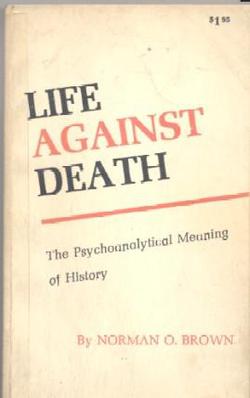
Life Against Death: The Psychoanalytical Meaning of History is a book by the American classicist Norman O. Brown, in which the author offers a radical analysis and critique of the work of Sigmund Freud, tries to provide a theoretical rationale for a nonrepressive civilization, explores parallels between psychoanalysis and Martin Luther's theology, and draws on revolutionary themes in western religious thought, especially the body mysticism of Jakob Böhme and William Blake. It was the result of an interest in psychoanalysis that began when the philosopher Herbert Marcuse suggested to Brown that he should read Freud.

Eros and Civilization: A Philosophical Inquiry into Freud is a book by the German philosopher and social critic Herbert Marcuse, in which the author proposes a non-repressive society, attempts a synthesis of the theories of Karl Marx and Sigmund Freud, and explores the potential of collective memory to be a source of disobedience and revolt and point the way to an alternative future. Its title alludes to Freud's Civilization and Its Discontents (1930). The 1966 edition has an added "political preface".

Gay Science: The Ethics of Sexual Orientation Research is a 1997 book by the philosopher Timothy F. Murphy about scientific research on sexual orientation.
Peter Joffre Swales was a Welsh "guerilla historian of psychoanalysis and former assistant to the Rolling Stones". He called himself "the punk historian of psychoanalysis", and he is well known for his essays on Sigmund Freud. A 1998 article in The New York Times Magazine noted his "remarkable detective work over the last 25 years, revealing the true identities of several early patients of Freud's who had been known only by their pseudonyms." He is one of three men whose machinations are described in the 1984 book In the Freud Archives, which originated as two articles in The New Yorker magazine that provoked Masson to file an unsuccessful $10 million libel suit against the magazine and its writer Janet Malcolm.
The Freudian Cover-up is a theory introduced by social worker Florence Rush in 1971, which asserts that Sigmund Freud intentionally ignored evidence that his patients were victims of sexual abuse. The theory argues that in developing his theory of infant sexuality, he misinterpreted his patients' claim of sexual abuse as symptoms of repressed incestuous desire. Therefore, Freud claimed that children who reported sexual abuse by adults had either imagined or fantasized the experience.

Knowledge and Human Interests is a 1968 book by the German philosopher Jürgen Habermas, in which the author discusses the development of the modern natural and human sciences. He criticizes Sigmund Freud, arguing that psychoanalysis is a branch of the humanities rather than a science, and provides a critique of the philosopher Friedrich Nietzsche.

The Assault on Truth: Freud's Suppression of the Seduction Theory is a book by the former psychoanalyst Jeffrey Moussaieff Masson, in which the author argues that Sigmund Freud, the founder of psychoanalysis, deliberately suppressed his early hypothesis, known as the seduction theory, that hysteria is caused by sexual abuse during infancy, because he refused to believe that children are the victims of sexual violence and abuse within their own families. Masson reached this conclusion while he had access to several of Freud's unpublished letters as projects director of the Sigmund Freud Archives. The Assault on Truth was first published in 1984 by Farrar, Straus and Giroux; several revised editions have since been published.

Freud, Biologist of the Mind: Beyond the Psychoanalytic Legend is a 1979 biography of Sigmund Freud, the founder of psychoanalysis, by the psychologist Frank Sulloway.
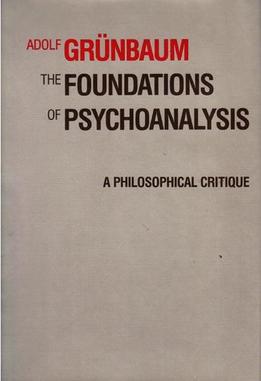
The Foundations of Psychoanalysis: A Philosophical Critique is a 1984 book by the philosopher Adolf Grünbaum, in which the author offers a philosophical critique of the work of Sigmund Freud, the founder of psychoanalysis. The book was first published in the United States by the University of California Press. Grünbaum evaluates the status of psychoanalysis as a natural science, criticizes the method of free association and Freud's theory of dreams, and discusses the psychoanalytic theory of paranoia. He argues that Freud, in his efforts to defend psychoanalysis as a method of clinical investigation, employed an argument that Grünbaum refers to as the "Tally Argument"; according to Grünbaum, it rests on the premises that only psychoanalysis can provide patients with correct insight into the unconscious pathogens of their psychoneuroses and that such insight is necessary for successful treatment of neurotic patients. Grünbaum argues that the argument suffers from major problems. Grünbaum also criticizes the views of psychoanalysis put forward by other philosophers, including the hermeneutic interpretations propounded by Jürgen Habermas and Paul Ricœur, as well as Karl Popper's position that psychoanalytic propositions cannot be disconfirmed and that psychoanalysis is therefore a pseudoscience.

Freud and Philosophy: An Essay on Interpretation is a 1965 book about Sigmund Freud, the founder of psychoanalysis, written by the French philosopher Paul Ricœur. In Freud and Philosophy, Ricœur interprets Freudian work in terms of hermeneutics, a theory that governs the interpretation of a particular text, and phenomenology, a school of philosophy founded by Edmund Husserl. Ricœur addresses questions such as the nature of interpretation in psychoanalysis, the understanding of human nature and the relationship between Freud's interpretation of culture amongst other interpretations. The book was first published in France by Éditions du Seuil, and in the United States by Yale University Press.

The Memory Wars: Freud's Legacy in Dispute is a 1995 book that reprints articles by the critic Frederick Crews critical of Sigmund Freud, the founder of psychoanalysis, and recovered-memory therapy. It also reprints letters from Harold P. Blum, Marcia Cavell, Morris Eagle, Matthew Erdelyi, Allen Esterson, Robert R. Holt, James Hopkins, Lester Luborsky, David D. Olds, Mortimer Ostow, Bernard L. Pacella, Herbert S. Peyser, Charlotte Krause Prozan, Theresa Reid, James L. Rice, Jean Schimek, and Marian Tolpin.

Freud: A Life for Our Time is a 1988 biography of Sigmund Freud, the founder of psychoanalysis, by the historian Peter Gay. The book was first published in the United Kingdom by J. M. Dent & Sons Ltd. The book has been praised by some commentators and compared to the psychoanalyst Ernest Jones's The Life and Work of Sigmund Freud (1953–1957). However, it has been criticized by authors skeptical of psychoanalysis, who have accused Gay of lacking objectivity and of repeating incorrect claims about Freud's work.
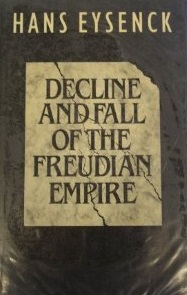
Decline and Fall of the Freudian Empire is a book by the psychologist Hans Eysenck, in which the author criticizes Sigmund Freud, the founder of psychoanalysis. Eysenck argues that psychoanalysis is unscientific. The book received both positive and negative reviews. Eysenck has been criticized for his discussion of the physician Josef Breuer's treatment of his patient Anna O., whom Eysenck argues suffered from tuberculous meningitis.

Homosexuality: A Philosophical Inquiry is a 1988 book by the philosopher Michael Ruse, in which the author discusses different theories of homosexuality, evaluates the moral status of homosexual behavior, and argues in favor of gay rights.

Freud: The Mind of the Moralist is a book about Sigmund Freud, the founder of psychoanalysis, by the sociologist Philip Rieff, in which the author places Freud and psychoanalysis in historical context. Rieff described his goal as being to "show the mind of Freud ... as it derives lessons on the right conduct of life from the misery of living it."

A History of the Mind: Evolution and the Birth of Consciousness is a 1992 book about the mind–body problem by the psychologist Nicholas Humphrey. Humphrey advances a hypothesis about consciousness that has been criticised as speculative.
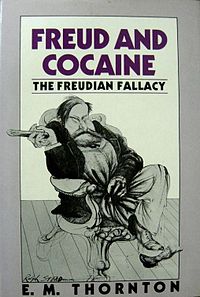
The Freudian Fallacy, first published in the United Kingdom as Freud and Cocaine, is a 1983 book about Sigmund Freud, the founder of psychoanalysis, by the medical historian Elizabeth M. Thornton, in which the author argues that Freud became a cocaine addict and that his theories resulted from his use of cocaine. The book received several negative reviews, and some criticism from historians, but has been praised by authors critical of Freud and psychoanalysis. The work has been compared to Jeffrey Masson's The Assault on Truth (1984).
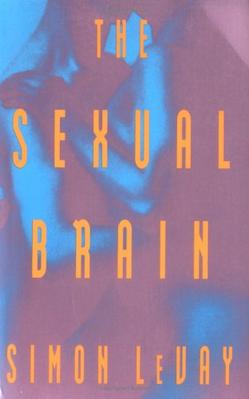
The Sexual Brain is a 1993 book about brain mechanisms involved in sexual behavior and feelings, and related topics such as sexual orientation, by the neuroscientist Simon LeVay. The book was praised as a well-written work on science. However, some reviewers pointed out factual errors, and noted that LeVay failed to prove that homosexuality has a biological basis.

Sex and Reason is a 1992 book about human sexuality by the economist and federal judge Richard Posner, in which the author attempts to explain sexual behavior in economic terms and discusses a range of controversial subjects related to sex, proposing reforms in American laws.

Philosophical Essays on Freud is a 1982 anthology of articles about Sigmund Freud and psychoanalysis edited by the philosophers Richard Wollheim and James Hopkins. Published by Cambridge University Press, it includes an introduction from Hopkins and an essay from Wollheim, as well as selections from philosophers such as Ludwig Wittgenstein, Clark Glymour, Adam Morton, Stuart Hampshire, Brian O'Shaughnessy, Jean-Paul Sartre, Thomas Nagel, and Donald Davidson. The essays deal with philosophical questions raised by the work of Freud, including topics such as materialism, intentionality, and theories of the self's structure. They represent a range of different viewpoints, most of them from within the tradition of analytic philosophy. The book received a mixture of positive, mixed, and negative reviews. Commentators found the contributions included in the book to be of uneven value.


















